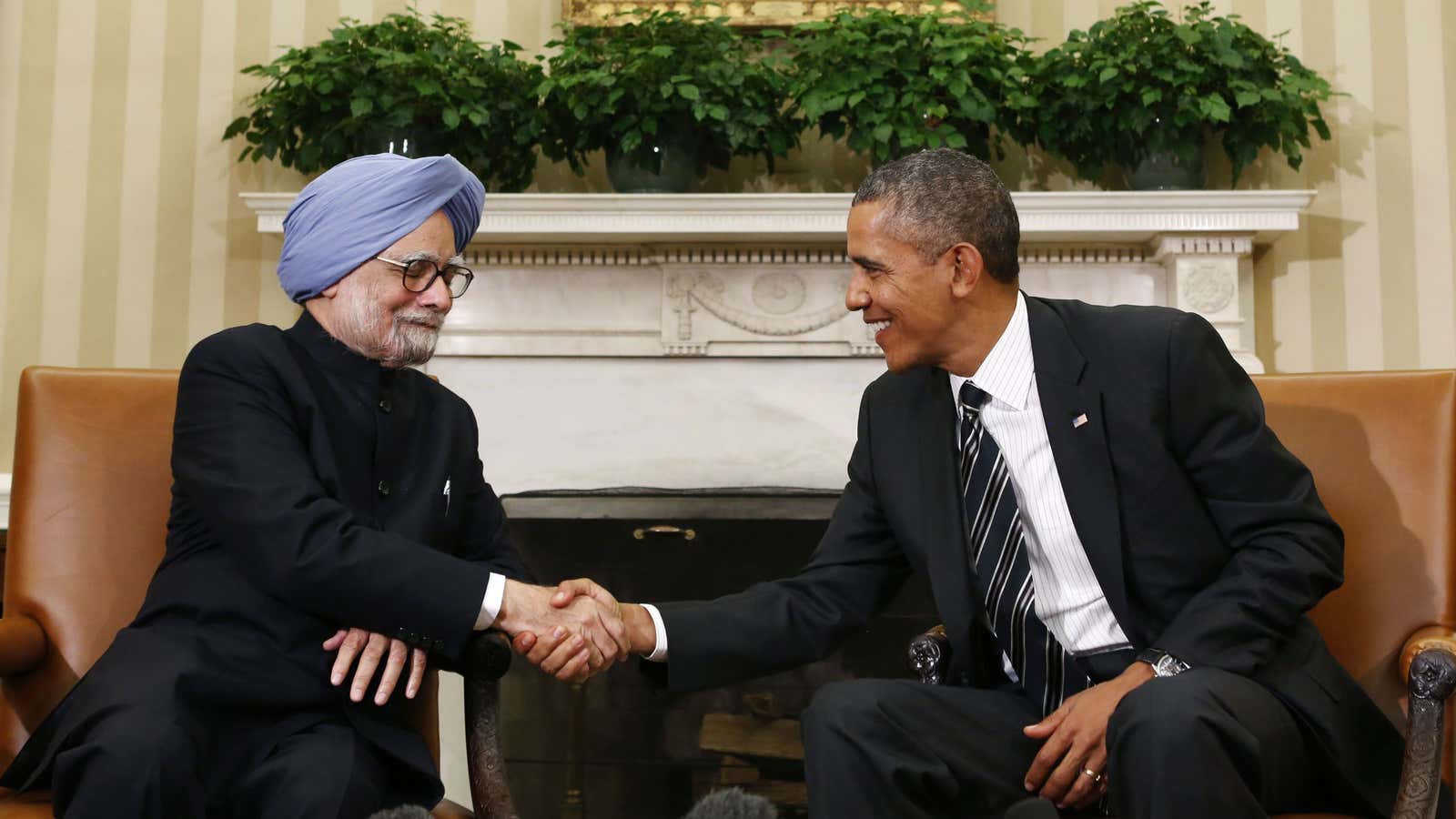US president Barack Obama and prime minister-designate Narendra Modi have several things in common despite the fundamental differences between the two men in their background, upbringing, and political beliefs. They each rose to power in revolutionary ways and it was the desire for major change that prompted the massive mandate they received. Obama is motivated by his desire to retain American primacy on the globe, while Modi is committed to bring India to the forefront of the world. Obama may not have anticipated the arrival of the Modi phenomenon and Modi may have a grievance that he has been denied a visa to enter the United States since 2005. But, given the interests and aspirations of the two countries, they cannot remain apart for long. Obama’s recent invitation to Modi is nothing but sincere and it may be accepted sooner than later. India needs the US as much as the US needs India. It is time for the India-US roller coaster to rise again.
Indeed, Modi, the pragmatist, who has broken several glass ceilings to get where he is today, will not be held back by old prejudices. To deliver on the promises he has made to the people of India, he needs to move fast not only on the domestic front, but also on the international scene. By ideology and instinct, he will move fast in building bonds with the corporate world in the US with the same alacrity that China has showed since 1972. His two priorities, economic advancement and defense preparedness, demand that he must pull out India-US relations from the low point they have reached.
The issues that have bedeviled the bilateral relationship since 2010 are not beyond redemption, even if they are tough. Modi’s Bharatiya Janata Party may have opposed the India-US nuclear deal, but the true architect of the nuclear rapprochement with the US was Modi’s mentor, former prime minister Atal Behari Vajpayee. If Bill Clinton had offered the deal, Vajpayee would have signed it. The BJP was only unhappy that Bush and Manmohan Singh reaped the harvest in 2005 of the seeds originally planted by the BJP in the tough climate of 1998-2000. The nuclear liability act, which has prevented the implementation of the deal so far can be amended, with the kind of majority Modi has in Parliament, opening up nuclear trade with the US. Similarly, by placing more orders for defense equipment, he should be able to erase the American grievance about India not purchasing fighter aircraft. Strengthening the defense preparedness against China will be fundamental to Modi. As for liberalization of the Indian economy, Modi does not have the constraints of coalition politics to stop him. He can distance himself from the Devyani Khobragade affair and move on to a relationship based on reciprocity.
Obama cannot but respond to such initiatives, because they will benefit the US economy and also pave the way for greater cooperation in the Asia-Pacific. Modi may continue a course of caution with China, but he is likely to build a close relationship with Japan and serve larger US larger interests. In return, the US could look at the two irritants, visa restrictions on Indian IT professionals and trade issues.
Further, Obama and Modi have a common interest in the war on terror and a peaceful transition in Afghanistan. A takeover of Afghanistan by the Taliban will serve the interests of neither country. If some US troops remain in Afghanistan beyond 2014, it will have a salutary effect on Pakistan and India. Consultations between the two on Afghanistan and Pakistan are the need of the hour. The US has long abandoned Pakistan as a major ally and moved to a strategic partnership with India, which is of utmost importance to the US.
The BJP has greater global ambitions than the Congress because of its nationalism and its vision of the respect that the Hindu civilization deserves to enjoy around the globe. It still celebrates the visit of Swami Vivekananda to Chicago, where he captured the imagination of the west by his oration on Hindu culture. One manifestation of its ambition will be to intensify India’s 30-year old effort to secure permanent membership in the UN Security Council. Pressuring the US to support India has so far yielded only a pious declaration from Obama that he wishes to see India as a permanent member one day. The US resistance is essentially because of the unease it feels about India’s record at the UN, which appears to counter US interests. A more pragmatic approach to international issues in which India does not have major stakes could raise the comfort level of the US with India and lead to a change in its opposition to India’s permanent membership. Obama would earn great goodwill in India if it budges on the issue of expansion of the Security Council. Objectively, the UN itself will benefit from some new permanent members from developing countries.
Recently, Washington buzzed with a rumor that Obama wanted to appoint USAID administrator Rajiv Shah as the next ambassador to India. It may have come from the fertile imagination of some Indians, but it underscored that Obama is the first president to rely on Indians to head up important and sensitive positions in his administration. The largest community of Indians in the US is from Modi’s home state, Gujarat, and many of them are rich and influential enough to sway things in favor of Modi’s India. If Obama appoints someone originally from Gujarat as the next ambassador to India, as Shah is, it may be an investment worth making.
The world will watch with interest how the chemistry between Obama and Modi develops in the coming days, as it has a stake in harmony between the two democracies. Both Obama and Modi are men with vision and courage. It is hardly beyond either to get over the current impasse simply for the sake of moving forward.




